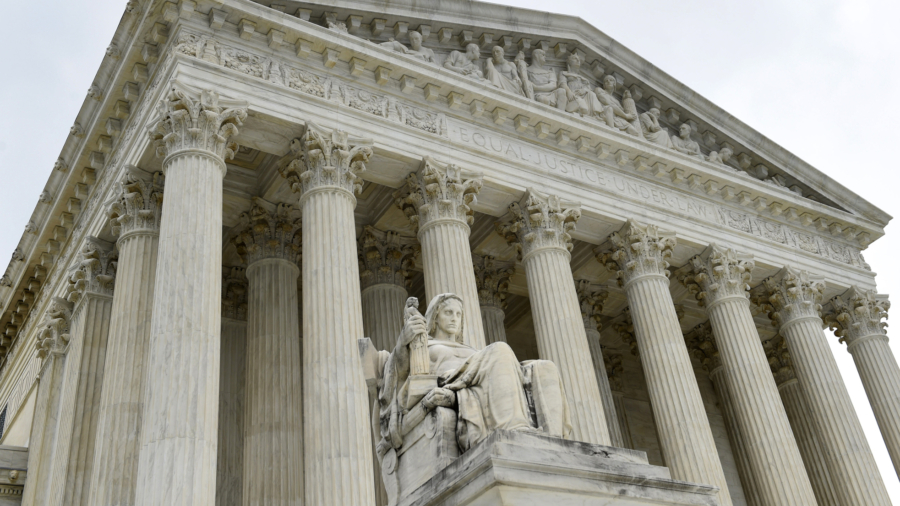The Supreme Court on late Friday turned away a California church’s request to lift a lockdown measure that capped attendance at in-person religious services.
The court was sharply divided in their decision with Chief Justice John Roberts joining the liberal justices in a 5-4 ruling that rejected South Bay United Pentecostal Church’s plea for injunctive relief from Gov. Gavin Newsom’s order that puts restrictions on public gatherings including in-person services. The state issued new guidelines earlier this week that limits church attendance to 25 percent of building capacity or a maximum of 100 attendees.
Lawyers for the church argued that the order violates the First Amendment’s religious exercise clause and discriminates against places of worship because “no comparable let alone equal limitations” are imposed on secular activities such as manufacturing, retail merchandising, or marijuana, or liquor dispensaries (pdf).
In a three-page opinion (pdf), Roberts disagreed with the church saying that California’s restrictions appear consistent with the First Amendment. He said that similar or more severe measures have been applied to comparable secular gatherings where people are in close proximity for an extended period of time such as lectures, concerts, movie showings, spectator sports, and theatrical performances.
He said the state’s order only treats more leniently to activities that are not comparable “such as operating grocery stores, banks, and laundromats, in which people neither congregate in large groups nor remain in close proximity for extended periods.”
Roberts said that it was not the role of the federal judiciary to be second-guessing officials who appear to be acting in good faith while making decisions about public health.
“Where those broad limits are not exceeded, they should not be subject to second-guessing by an ‘unelected federal judiciary,’ which lacks the background, competence, and expertise to assess public health and is not accountable to the people,” Robert said, referring to the officials.
He said that the officials have been entrusted with the role to protect the safety and the health of the people by the Constitution and in this case have been “actively shaping their response to changing facts on the ground” during the CCP (Chinese Communist Party) virus pandemic, also known as the novel coronavirus that causes the COVID-19 disease.
“The precise question of when restrictions on particular social activities should be lifted during the pandemic is a dynamic and fact-intensive matter subject to reasonable disagreement,” he said.
The court’s four other conservative justices dissented, saying that they would have granted the temporary injunction for the church because the state’s guidelines discriminate “against places of worship and in favor of comparable secular businesses.”
Justice Brett Kavanaugh, who wrote the dissent, said such discrimination violates the Constitution. He said the church and its congregants are simply seeking equal treatment with comparable secular businesses. He was joined by Justices Clarence Thomas and Neil Gorsuch.
“California already trusts its residents and any number of businesses to adhere to proper social distancing and hygiene practices. The State cannot ‘assume the worst when people go to worship but assume the best when people go to work or go about the rest of their daily lives in permitted social settings,'” Kavanaugh wrote.
Charles LiMandri, special counsel to the Thomas More Society, who is representing the church, called the top court’s decision “disappointing.”
“It was based on the very high standards required for obtaining an emergency injunction on appeal of a case that is still ongoing in the lower courts. The majority opinion was simply a one-sentence decision not to grant emergency relief at this time – without any analysis. However, Chief Justice John Roberts, writing on his own and with no other Justices joining him, authored a concurring opinion that should have little or no precedential value,” LiMandri said in a statement.
“It is absolutely imperative that the U.S. Supreme Court considers these important issues on the merits–after the rulings in the lower courts become final. Although this interim ruling is disappointing, it’s clear to us that, without the filing and vigorous litigation of this lawsuit, churches would still be closed in California under Governor Newsom’s original shut-down orders,” he added.
The ruling on the California case comes hours after the top court denied a similar request made by two Chicago-area churches who were seeking relief from a public-health order that had limited in-person religious services to 10 people, which expired on May 29. Before the Supreme Court acted on the request, the state had issued new guidance (pdf) that encouraged places of worship to limit attendance to 25 percent of building capacity or a maximum of 100 attendees.
“The Illinois Department of Public Health issued new guidance on May 28. The denial is without prejudice to Applicants filing a new motion for appropriate relief if circumstances warrant,” the court wrote in the order (pdf).
From The Epoch Times


